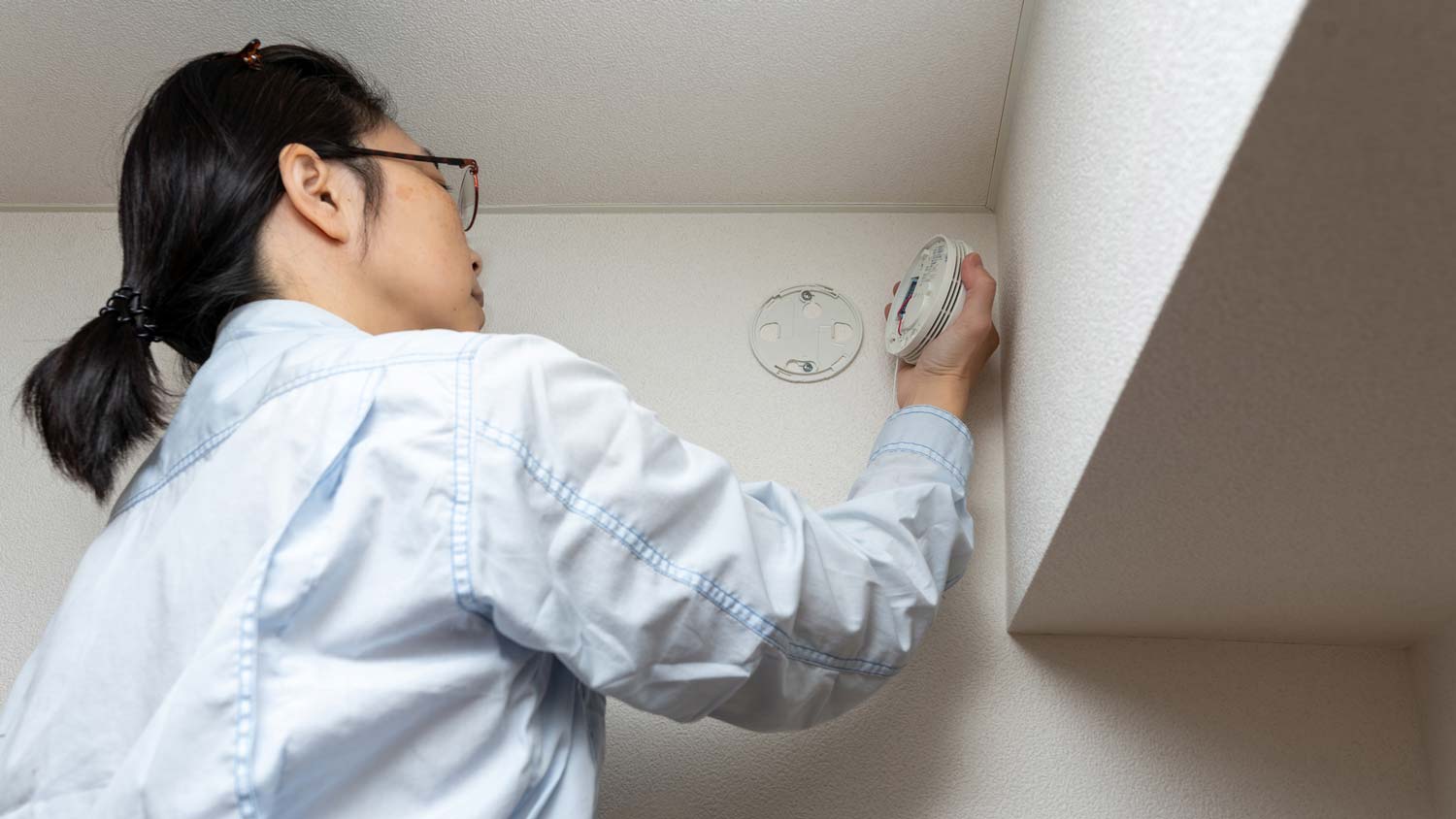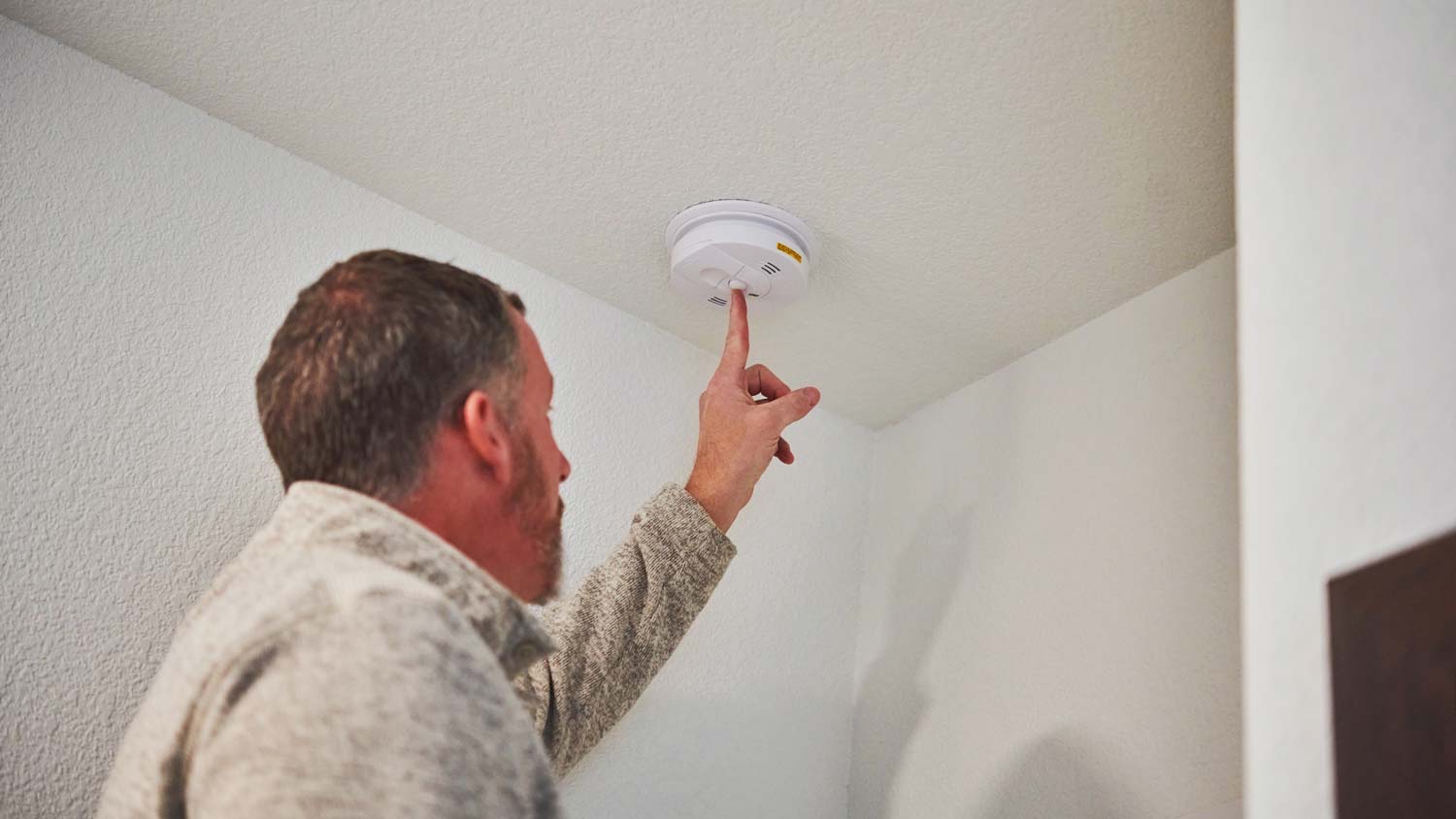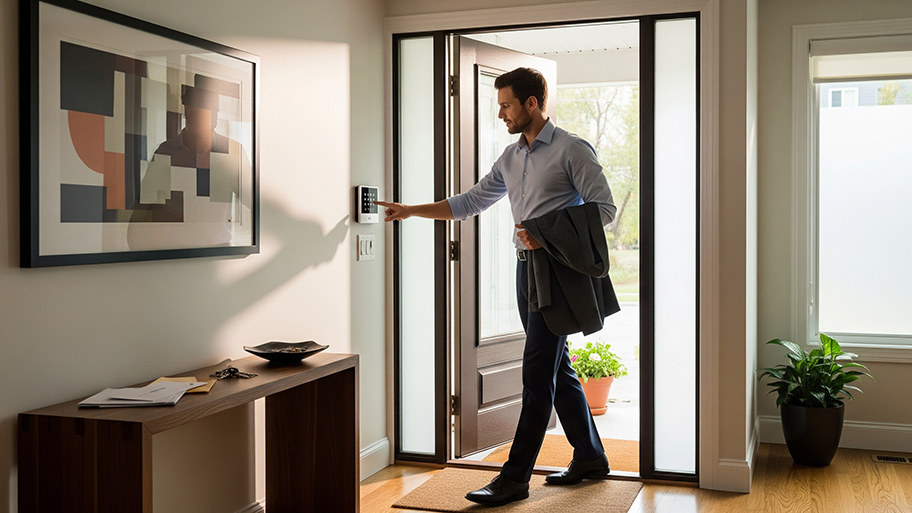
Feeling safe at home should always be a priority, and installing a new security system can help you do just that—no matter where you live.
Once you know the cause, you can keep the beeping at bay


Low batteries, dirty detection chambers, and incorrect settings all cause beeping.
Most fixes are simple and affordable, but anything electrical requires a pro.
Smoke alarm repair is often more expensive than replacing one entirely.
Don’t remain in the dark if you’re wondering why your smoke alarm won’t stop beeping. There are a number of reasons for this. The good news is only a few of them require a pro. Most fixes require you to only check out the alarm and simply swap a battery, tighten a few screws, or other straightforward fixes. Read on and learn what’s causing the issue in the first place, along with solutions for the issues.

Knowing how to install a smoke alarm is essential for safety reasons but also because an incorrect setup is more likely to lead to random beeping. Many models are battery-powered and extremely easy to put together—usually just requiring you to stick them onto or drill them into your ceiling—which means that your problem may be as simple as a low or improperly placed battery. When in doubt, check this out first because it’s also the quickest fix. Everything from an obstructed battery terminal to a cover that’s partially open could be at fault.
Remove the smoke alarm from the base.
Take out the old battery and swap it with a new one.
Put the smoke alarm back in its base.
If a new battery doesn’t solve the problem, you may have a problem with the battery wires. Replace it by installing a new smoke alarm if you have wire problems.
Every new smoke alarm includes a pull-out plastic tab in the battery section that absolutely must be removed. However, because it’s so small, it’s easy to overlook and is often a cause of frequent and repetitive beeping. When checking your batteries for any problems, confirm that you didn’t forget to pull out this little nuisance while you’re at it.
Remove the smoke alarm from the base.
Remove the clear tab. It may be hidden under the battery or folded against the plastic.
Certain models may not have a clear tab. If so, look for plastic tabs near the battery to take out.
Put the smoke alarm back in its base.
If you’re wondering why your smoke detector keeps beeping, it’s susceptible to dust accumulation, like the other parts of your home. If allowed to build up enough, it can even prevent the detection chamber from doing its job properly and cause it to beep at random and unwarranted moments. Annual or biannual cleanings are all it takes to ensure that this is way less likely to happen.
Remove the smoke alarm from the base.
Use compressed air to clean out the sensor. Don’t blow in it, as this could add moisture from your breath and damage the sensor.
Put the smoke alarm back in its base.
Replace the entire alarm if your sensor is broken. If you aren’t comfortable doing this yourself, hire a pro.
Smoke alarms are built to be sensitive to stimuli in order to properly alert you when there’s a hazard, but that can also make them susceptible to sounding off at other elements that aren’t a danger. That could be anything like excessive shower steam or humidity, rapid temperature changes, and even extended sunlight exposure. That’s why it’s important to choose a spot where it’s unlikely to be affected by such harmless conditions during installation.
Keep a log of when your alarm beeps.
Determine the cause by finding a pattern of when and how often the alarm beeps.
Sometimes, the easiest fix is opening a window when the stimuli activates the alarm.
Despite the name, accidentally setting your alarm to silent mode may cause chirping in some models. Double-check the settings on your machine and toggle between your options until the beeping stops. You may have to wait a few minutes between testing the various modes to fully understand how each one causes the alarm to behave.
If you have smart smoke alarms, use the app and look for error codes or necessary updates.
For manual devices, remove the smoke alarm from its base and make sure none of the setting switches are gunked up with dust.
Try switching the battery after changing the settings to make sure they won’t reset.
Put the smoke alarm back in its base.
If everything is in order and your alarm is still behaving strangely, a residual charge from old batteries could be the problem. Even when batteries die, parts of the machine can retain the charge they received from the old batteries. This can make them act up when you do finally fill the terminal with new batteries.
Remove the smoke detector from the base.
Remove the batteries from the terminal and hold down the test button for 30 seconds.
If your terminal doesn’t have a backup power source, you’ll need to install new batteries and perform the test.
Return it to its housing. It should function normally.
Smart alarms save all errors to a database; after a while, this buildup of information may trigger your smoke alarm to beep when it shouldn’t. As with most computers, though, the fix for this is as simple as stopping and restarting your machine.
Reset the smoke alarm by removing the battery and adding a new one.
Hold down the reset button until it activates.
Make sure it’s functioning normally after a reset.

Nothing lasts forever, and that adage is also true for gadgets like smoke detectors. Sometimes, the only fix for the beeping is to ditch the old model for a new one. Most smoke detectors are good for 10 years or so.
Check to see if you have a warranty.
If not, replace the smoke alarm with a comparable model.
A pro or specialist at a hardware store can help match the unit or find a replacement.
If you’re trying to determine why your fire alarm keeps beeping, tripped breakers and other such electrical issues can also cause unwanted beeping from smoke detectors, but only those that are hardwired to your electrical system.
However, most homeowners shouldn’t tackle electrical work and should hire a pro. You’re better off hiring a smoke detector installer near you to fix it than trying your hand with such an important piece of safety equipment.
Locate the circuit breaker.
Make sure it’s in the correct position.
If in doubt, flip the master breaker off and on, then flip individual breakers until they are all in the on position.
If this doesn’t solve the problem, hire a smoke alarm pro to investigate. Don’t try and figure out complicated electrical issues on your own.
Hiring a professional to fix the beeping is a good idea if your smoke alarm is hardwired to your electrical system or if you need to replace the detector altogether. The cost to install a smoke detector ranges from $10 to $80 on average.
On the flip side, repairs are a bit more expensive—between $70 and $150 on average—so it may be worth it to simply swap old for new if you can’t manage to fix your current model by yourself. For most homeowners though, calling a local electrical expert is the best route to take.
From average costs to expert advice, get all the answers you need to get your job done.

Feeling safe at home should always be a priority, and installing a new security system can help you do just that—no matter where you live.

Motion-sensor lighting costs vary greatly because they have so many customizations available. Learn more by using this cost guide about motion-sensor lights.

A security camera system gives you peace of mind that there’s always a watchful eye on your home. Learn the costs of installing surveillance cameras.

Need to know how to reset an alarm system? Our guide outlines the four easy steps it takes to reset your device without needing to call a pro.

This guide will help you disconnect a home alarm system, whether you’re installing a new system or just want old electronics out of your house.

Learn about wired versus wireless security cameras to decide which option offers more reliable surveillance at your home.